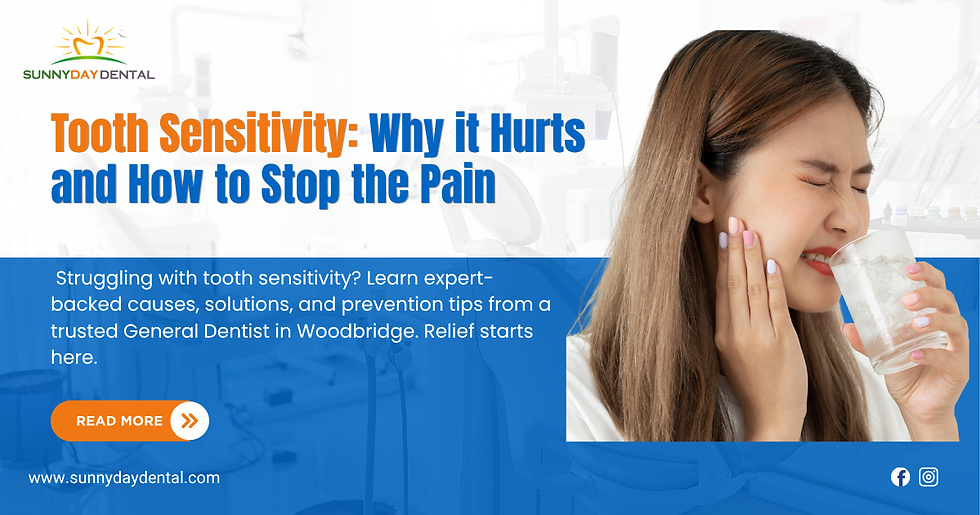Child Dental Emergencies: How Parents Can Stay Calm and Act Fast
- Sunny Day Dental
- Jun 6
- 3 min read

As parents, nothing is more distressing than seeing your child in pain. Dental emergencies in children can happen unexpectedly, whether from a fall at the playground or a sudden toothache before bedtime. Knowing how to act quickly and effectively in a child dental emergency can be the difference between saving and losing a tooth, or stopping a minor issue from becoming a major one.
This blog provides a step-by-step guide to help parents navigate these situations with calm, clarity, and confidence.
1. Recognizing a True Child Dental Emergency
Not all dental issues require an immediate visit to the clinic. However, here are the most common signs that demand urgent attention:
Knocked-out (avulsed) tooth
Cracked or chipped tooth
Severe, persistent toothache
Dental abscess or swelling on the face or gums
Excessive bleeding from the mouth
If your child displays any of these symptoms, you're likely dealing with a child dental emergency.
2. First Aid Steps Parents Should Know
Knocked-Out Tooth
Baby tooth: Do not reinsert it. Contact your dentist immediately.
Permanent tooth: Rinse with clean water (avoid scrubbing), gently place back in the socket if possible, or store in milk and rush to your dental clinic.
Child Chipped Tooth Treatment
Rinse your child’s mouth with warm water.
If there is bleeding, apply gauze with gentle pressure.
Save any broken tooth fragments and store them in a clean container.
Avoid chewing on the affected side.
Schedule a visit for child chipped tooth treatment promptly.
Severe Toothache
Rinse mouth with lukewarm water.
Use cold compress on the outside of the cheek for swelling.
Avoid aspirin, which can irritate gums.
Use safe over-the-counter options for child toothache relief and visit your dentist the same day.
3. Managing Dental Pain in Children at Home
Until you reach the dentist, focus on managing dental pain in children with these methods:
Children’s acetaminophen or ibuprofen (based on age and dosage guidance)
Cold compress every 15–20 minutes
Encourage soft, non-sugary foods
Avoid hot or cold drinks if teeth are sensitive
These temporary steps can ease discomfort in a child dental emergency, but never delay professional care.
4. When to Call Emergency Dentistry in Woodbridge
If your child’s dental injury involves heavy bleeding, swelling that affects breathing, or extreme pain, it’s time to contact emergency dentistry in Woodbridge. Clinics like Sunny Day Dental offer immediate care, even after hours, to treat emergencies with child-friendly expertise.
5. Prevention Tips Every Parent Should Follow
Ensure your child wears a mouthguard during sports
Teach safe habits like no running with objects in the mouth
Schedule regular dental checkups
Avoid hard candies and ice-chewing
Encourage gentle brushing with a soft-bristled toothbrush
By being proactive, you reduce the chances of facing a child dental emergency.
Quick Steps for a Child Dental Emergency
What to do in a child dental emergency?
Stay calm and comfort your child
Stop any bleeding with gentle pressure
Rinse mouth with warm water
Save tooth fragments or knocked-out teeth
Apply cold compress to reduce swelling
Call your emergency dentist in Woodbridge immediately
Your Partner in Pediatric Dental Emergencies
Dental emergencies are stressful, but having the right knowledge and a trusted dental team can make all the difference. At Sunny Day Dental, we specialize in gentle, responsive care during any child dental emergency. From child toothache relief to advanced child chipped tooth treatment, our team is here for your family when it matters most. If your little one needs urgent help, call us right away or book an emergency appointment online.
FAQs
Q1: Can a baby tooth injury still count as a dental emergency?
Yes, even though baby teeth fall out naturally, damage can affect permanent teeth growing underneath. Always consult your dentist if a baby tooth is injured.
Q2: My child complains of dental pain at night. Should I wait until morning?
Not always. If the pain is severe, accompanied by swelling, or if your child can’t sleep, it’s better to call an emergency dentist. Pain might indicate an infection or abscess.
Q3: How long do I have to save a knocked-out permanent tooth?
The golden window is 30 minutes. Immediate reimplantation increases the chances of saving the tooth. Store it in milk or saliva and rush to the dental clinic.
Q4: Is it safe to give painkillers for dental pain in children?
Yes, age-appropriate doses of acetaminophen or ibuprofen can be used. Never apply medication directly to gums or teeth, and consult your dentist for safe options.
Q5: What’s the risk of ignoring a chipped tooth in a child?
Even if the chip looks minor, it can expose nerves or enamel to bacteria, increasing the risk of decay or infection. Child chipped tooth treatment should never be delayed.




Comments